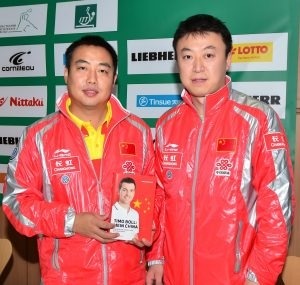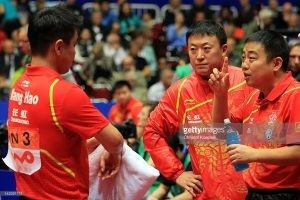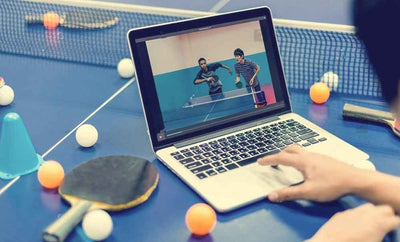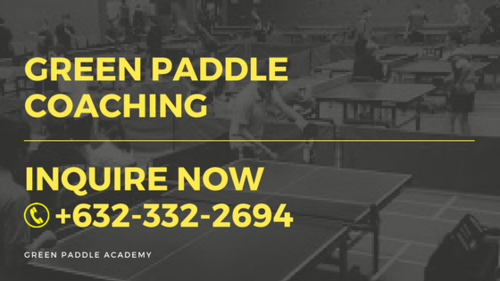
Why You Need a Professional Table Tennis Coach
What are the benefits of having a professional table tennis coach? Is hiring a coach well-worth the investment? These are sound questions. Having a coach is obviously not necessary in achieving your table tennis goals but it can hasten the process of achieving and give you more confidence along the way.
But before we dwell on the some of the many benefits of having a professional coach, it is important to fully grasp on the very definition of a PROFESSIONAL table tennis coach. What makes a table tennis coach professional?
-
He/she has an established credibility and is well renowned amongst the table tennis community present in your locality.
-
He/she is able to produce substantial knowledge, exercise skills, and offer good advices from his/her table tennis experiences and learnings.
-
He/she is a good listener and a great conversationalist. He/she is able to help players discover their inner wisdom and tap their potential through the use of effective conversational methods.
-
He/she is naturally adaptive and compatible to anyplaying-style, playing behavior of players. Compatibility and good chemistry plays an essential role in maximizing the coaching experience.
Here are five of the many benefits of having a professional coach:
A professional coach propels encouragements that gets his/her players to train harder for peak performance.
A research by Diane Wiese-Bjornstal suggests that emotions, feelings, and actions of players in their area of sport largely depended on the influences of their coaches. Studies of Coach Effectiveness Training have also shown the positive results of positive coaching. These studies have found that players displayed higher self-esteem when they were coached effectively than when they started off without one. They were also reported to have lower anxiety levels after the coaching experience. It goes without saying that highly motivated players will certainly perform better than the lowly motivated ones.
A professional coach celebrates small successes and offers positive reinforcement, in which psychologically speaking, can really fuel up the motivation and hype of his/her players. Part of his/her job is exploring how each player gets motivated and exercising the means to get them stay motivated.
May it be in constant verbal encouragements, perpetuating sense of professionalism in every action he/she takes, being physically present and genuinely supportive in tournaments, whatever means it is that they use to encourage their players, it will bear of heightened chances for their players attaining peak performances faster and easier.
A professional coach offers sensible and sound evaluations that reveals his/her players’ areas of improvement.
Experienced table tennis players know that regardless of their skill level, many still fail to recognize their weaknesses and errors during in-game matches may it be in tournaments or casual gaming. Even in training when table tennis players are tasked to do particular drills and exercises, a lot still do not realize their shortcomings and unorthodox means of playing (may it be in footwork, stroke, service, ball placing, the list goes on). This is because apart from the fact that they have minimal amount of time for thinking, realizing and personally observing their own play-style, players especially the most subjective ones, have the natural tendency to justify every act they do in-game and disregard whatever the coaches are suggesting.
That is why it is essential to have a professional coach by your side to evaluate your play-style and debunk all possible ineffective and toxic play-styles, and consequently strengthen essential table tennis skills you possess. That is why it is essential to have a professional coach explain these natural tendencies and how they can be avoided. These are all beneficial, all the better when these evaluations are professional and proficient.
A professional coach helps his/her players go through seemingly impossible obstacles in their athletic journey.
Apparently, each table tennis player faces may it be personal, psychological, emotional, or work-life limits that are far beyond their control. Take the case of being a student-athlete having to deal with tons of academic workload, the lack of sleep, the stress, all balancing it together with routinely training. Or take the case of a team environment promoting hostility and unfairness that are toxic, or a supposed learned helplessness of the players for always failing to secure a podium finish and always landing in bottom places in whatever tournaments they engage in. Or, plainly being unable to exploit the opponents’ weaknesses, being trounced by a very skillful player, being unable to overcome anxiety and pressure in the game, being unable to display the peak performance during tournaments.
There are a lot of instances where players can feel demotivated and think of turning away from sports due to these, from light to extreme, limits they can encounter in their table tennis journey. Professional coaching can help you in such a way that your coach can rewire your thinking through looking at other perspectives, clarifying your challenges, and guiding you to taking the most viable course of action to take there is at your given dilemmas. Coaches can also offer practical help should they be available during your times of troubles, all the more when it is table tennis related.
A professional coach helps his/her players expand their thinking.
In relation to the third point, most of the challenges we encounter on a daily basis are from the cognitive biases, the sheltered and constrained thoughts that we feed our minds with. These become the reason for our limitations. A professional coach will expand your thinking and help you get out of very dysfunctional and enclosed mindset. All teachings, advices, and suggestions are sure to come from his/her supreme, genuine experiences and handed-down learnings from a much, much credible coach he had.
A professional coach exposes and networks his/her players to other table tennis coaches.
What better can a professional coach do for you once he/she had already awoken and tapped the hidden potential within you than expanding your network and table tennis social circle, possibly getting you tangible benefits such as sponsorships, and even scholarships? After being facilitated in your transition to becoming a better table tennis player and developed into a readily competitive and skillful player, a professional coach exposes you to larger table tennis environments with better players to play with, better competition to challenge yourself with. Being exposed and widened off from your accustomed training routines, tune-up games, playing in familiar clubs, your transition to becoming a better table tennis player will indubitably hasten and smoothen. This is because your opponents will be better, forcing you to enclose the stretch of playing gap you have against them, you will encounter more variety of play-styles, and you will get more recognition and appraisal responsible for motivation.
Do I still need a professional coach even if I already play in the competitive level?

Then YES! No matter how extensive and heavy the experience and skills you get, unless you find yourself constantly exhausted from table tennis routinely drills and exercises that you used to do with ease due to aging, and feeling the need to retire, YOU NEED A PROFESSIONAL COACH.Unless you have already reached the peak of your table tennis maturity from decades of rigorous training and tournament experiences and have already been at par with decently experienced players renowned internationally with the likes of Liu Guoliang, Jan Ove Walder, Jorgen Persson… which were, by the way, just strained to enter the professional coaching industry due to biological constraints (aging)…
Even world caliber players competing regularly in international tournaments, given their tireless training and insurmountable amount of experiences from daily training and tune-up games, have professional and some even personal coaches by their side always ready to mentor them and still impart a handful of usable knowledge.
Liu Guoliang and the Chinese National Table Tennis Team

Ma Lin struggled with the desire and motivation to win. Wang Hao got butterflies (not just the brand) whenever he played in major leagues. Both experienced somatic anxiety. For the case of Ma Lin, what Liu Guoliang did was he always arranged a match with money at stake between Ma Lin and other Chinese national team members. This skyrocketed the performance of Ma Lin and desire to win. Liu Guoliang helped Ma Lin shift perspective and ‘focus on the prize.’Liu Guoliang is the present-day head coach of the Chinese national table tennis team. That goes to say that he is the one responsible for the performances of the top-ranked Chinese table tennis players, from the likes of Ma Long, Zhang Jike and Xu Xin. But he was best known for engineering the anxiety-matter problems of former world champions Ma Lin and Wang Hao.
For Wang Hao’s case, Liu Guoliang lowered Wang Hao’s target to mainly just making it to round 1. Counterintuitively, Wang Hao became highly motivated and rediscovered his desire to win, as opposed to slacking off after the first round.
If it weren’t for Liu Guoliang’s arrangements and tactical aid for the two of these Chinese table tennis players, Wang Hao and Ma Lin would’ve had a harder time clinching the top positions in the world, or worse yet, would not have gotten there at all!





Leave a comment